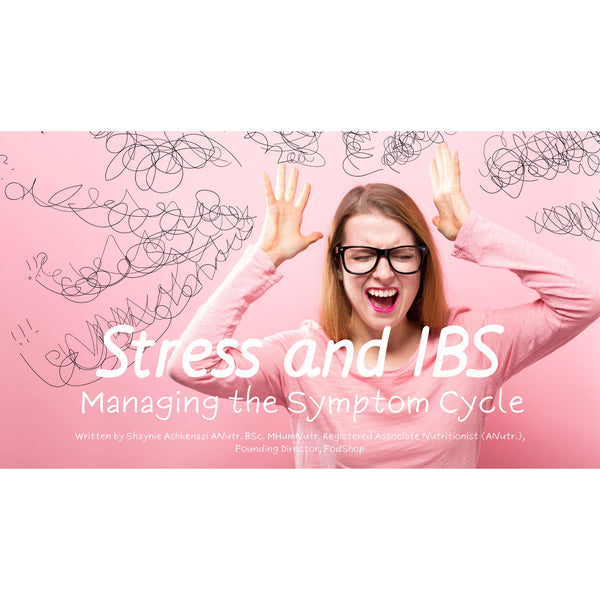- Ph: +61 435 003 412
- operations@fodshopper.com.au
"Organic Orange" has been added to your cart. View cart
"Organic Orange" has been added to your cart. View cart

Irritable bowel syndrome (IBS) is a chronic functional gastrointestinal disorder which affects more than 10% of the world's population or 1 in 7 people worldwide.
IBS is characterized by abdominal pain or discomfort associated with a change in frequency or consistency of stools, but without any apparent abnormalities.
The cause of IBS isn't completely understood, but scientific research suggests that it is most likely due to complex interactions between the hormonal, immune, and nervous systems.
In order to understand the link between stress and IBS symptom onset, let's first understand what stress is in the body.
Stress is a normal human reaction, and the human body is designed to experience it and react to it. When you experience life challenges or changes (stressors), the body produces physical and mental responses involving the nervous system.
Stress responses help your body adjust to new situations. Stress can be positive, keeping us alert, motivated and ready to avoid danger. However, stress becomes detrimental when stressors continue without periods of relaxation or relief.
The body’s autonomic nervous system controls breathing, heart rate, and vision. Its in-built “fight-or-flight" response protects the body by enabling it to respond to stressful situations.
Short term physical symptoms of stress include muscle tension, headaches, aches and pains. Long term consequences of untreated stress include cardiovascular and cancer risks.
In people with IBS, however, the long term impact of persistent stress on the gastrointestinal system is not known. Anecdotally, we do know that the impact of bowel symptoms resulting from stress (abdominal pain, diarrhoea, cramping etc..) carry psychosocial, nutritional, and physical consequences on the quality of life of the IBS sufferer.
Stressors are different for every person and can commonly include anxieties around food, accessibility to a bathroom and body image among others. Regardless of the cause(s), the chemical response is the same.
Chemicals in the brain are released in response to stressful or anxious thoughts, sending signals to the gut, causing it to spasm.
Consequently, the brain becomes more aware of the spasming in the colon, creating a "hyper-alertness" i.e. fear of symptoms or anticipation of symptom onset, increasing further likelihood of triggering symptoms.
IBS may also be triggered by the immune system, dysfunction along the hypothalamic-pituitary-adrenal (HPA) axis, and may also involve metabolic effects, all of which may ultimately impact the normal functioning of the gastrointestinal tract.
Scientific evidence shows that psychological stress, whether it is acute or chronic, occurring in childhood or adulthood, has a significant impact on intestinal function, and has even shown changes in the intestinal microbiome.
This therapy is non-invasive and shows that it has just as effective results as a low FODMAP diet in reducing gastrointestinal symptoms and improving quality of life.
Hypnotherapy addresses the “miscommunication” between the gut and brain. A trained therapist guides the person with IBS into a state of focused awareness while in a deep state of relaxation.
Some data shows that low-to-moderate exercise i.e. light walking may reduce episodes of constipation in IBS-C, and may also reduce the immune response to IBS as indicated by a reduction in inflammatory molecules in the body.
The current literature shows that yoga is an effective modality and may be just as effective as pharmacological treatment, dietary interventions or light-to-moderate-intensity walking, and may have anti-depressive benefits also.
The approaches used by conventional medicine for stress-related disorders include antipsychotics, tricyclic antidepressants, atypical and natural medicines. Please visit your GP or specialist doctor to discuss if this approach is right for you.
While there are no studies showing a relationship between following a low FODMAP diet and reduced stress pre se, anecdotally, the diet may provide rest-assurance that IBS symptoms are less likely to be triggered when fermentable carbohydrate consumption is minimised.
The relationship between stress and IBS is complex. There is still a lot we don't understand about why stressful events trigger IBS symptoms in some people but not others, though IBS sufferers are known to experience a phenomenon called visceral hypersensitivity.
The good news is that there are various symptom management therapies and treatment modalities available to help manage the effects of stress on the gastrointestinal system.
If you are struggling to achieve symptom relief due to chronic, unmanaged stress, please visit your GP to receive a referral to a gut-directed hypnotherapist and/or clinical psychologist who specialises in gastroenterology, and/or an Accredited Practising Dietitian with a specialty in IBS and/or the low FODMAP diet.
Behzad Hajizadeh Maleki, Bakhtyar Tartibian, Frank C. Mooren, Leah Z. FitzGerald, Karsten Krüger, Mohammad Chehrazi, Abbas Malandish,
Low-to-moderate intensity aerobic exercise training modulates irritable bowel syndrome through antioxidative and inflammatory mechanisms in women: Results of a randomized controlled trial, Cytokine, Volume 102, 2018, Pages 18-25, ISSN 1043-4666. https://doi.org/10.1016/j.cyto.2017.12.016.
D’Silva, A., MacQueen, G., Nasser, Y. et al. Yoga as a Therapy for Irritable Bowel Syndrome. Dig Dis Sci 65, 2503–2514 (2020). https://doi.org/10.1007/s10620-019-05989-6
Peters, S.L., Yao, C.K., Philpott, H., Yelland, G.W., Muir, J.G. and Gibson, P.R. (2016), Randomised clinical trial: the efficacy of gut-directed hypnotherapy is similar to that of the low FODMAP diet for the treatment of irritable bowel syndrome. Aliment Pharmacol Ther, 44: 447-459. https://doi.org/10.1111/apt.13706
Qin HY, Cheng CW, Tang XD, Bian ZX. Impact of psychological stress on irritable bowel syndrome. World J Gastroenterol. 2014;20(39):14126-14131. doi:10.3748/wjg.v20.i39.14126.
dietary fibre , Dietitians , FODMAP , FODMAP diet , FODMAP expert , FODMAP foods , FODMAP Friendly , FODMAP Friendly Foods , FODMAP Learning , gastroenterology , Gut Bugs , gut directed hypnotherapy , gut health , hypnotherapy , IBS , ibs det , IBS diet , ibs foods , IBS friendly recipes , IBS management , ibs stress , irritable bowel syndrome , mindfulness , Monash University Low FODMAP Diet , Prebiotics , probiotics , soluble fibre , stress management , suntheanine

Leave a reply